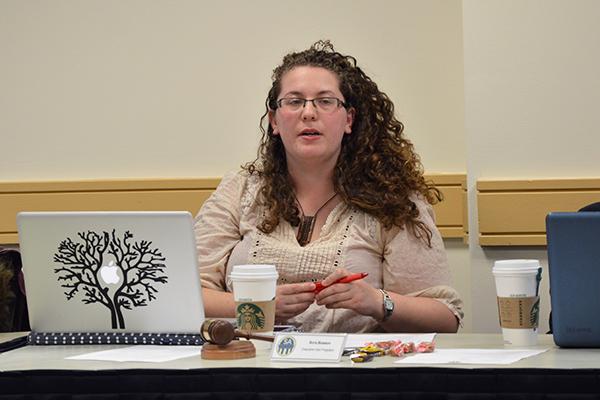The Student Association Senate’s top leader said the 36-person body’s productivity has been lagging so far this year because members have come to meetings unprepared to work effectively.
The last two SA Senate meetings have ended with Executive Vice President Avra Bossov warning senators to be more prepared before they come to a session after discussions over bills have led to hostility on the floor, including overly drawn-out debates and even a recommendation to move for a vote of no confidence in Bossov.
Bossov issued last week’s warning after debate over a bill led to 45 minutes of conversation and confusion over senate procedures. Bossov then made the deciding vote that shot down the bill, which would have added a student-wide vote on whether GW should divest from fossil fuel companies to the ballot in March.
“Student advocacy, especially on an issue as important as this, is crucial to change. As such it is equally crucial that such advocacy is well organized,” Bossov said. “I have repeatedly told senators that they must come prepared to these meetings. Unfortunately, that did not happen this meeting.”
Bossov, who leads the senate, consulted SA President Nick Gumas, who doesn’t have any formal role in senate procedures, before she made her vote. Tensions came to a head when Sen. Alfredo Pelicci, Law-G, called for a vote of no confidence in Bossov, saying she had crossed a line when she spoke with Gumas. No other senators joined in the effort.
And when Gumas addressed the senate at the end of the meeting, during the public comment portion, Pelicci stood up and faced away from the president.
“I actually really respect Nick and Avra. They do a lot of work. Maybe I overreacted with the no confidence vote,” Pelicci said later during the meeting. “But this is our body. We invite you here. It’s not good for you to have a conversation with the head of our body before she casts an important vote.”
Gumas, who served as a senator for two years before being elected president last spring, said he was upset with the debate the senate was having.
“This is the bottom,” he said. “I only hope the senate can go up after this.”
He later added in an email that “the senate has done a lot of great work this year and I hope that one bad meeting doesn’t overshadow that good work.”
Center for Student Engagement Director Tim Miller, who advises the SA, said he reminds senators to take advantage of their roles as student leaders but that they shouldn’t take their positions too far.
“As I always tell the SA, this is not the U.S. Senate, this is the George Washington University Student Association and this is a time to learn how to work with people and how to manage and lead organizations,” he said in an email. “I also ask them to take their roles seriously but don’t take themselves too seriously and keep a healthy perspective about their roles.”
Sen. Ben Pryde, U-At-Large, said part of the problem is that the senate faces turnover every year. He said he didn’t think there were more new senators this year than previous years.
He said keeping new senators informed about senate procedures is a constant challenge the organization has to face.
“I think everyone just did what they thought was right and unfortunately maybe it wasn’t the best process in the end,” he said.
Some of the senate’s most familiar faces have left this year. Former Sen. Will Rone, SEAS-G, the senate’s longest-serving member, stepped down in January. Two of the three law school senators were also recently replaced with new members.
Bossov said she has encouraged senators to speak with her and other members of the executive cabinet if they have questions about SA policies and procedures, but only one has reached out to her during the two-week interlude between meetings this semester.
“Let me help you,” she said at the end of a January meeting. “Let me help you help our student body.”
Connor Schmidt, the president of College Democrats, said he believes senators will sometimes forget who they represent and make decisions based on procedure instead of what organizations need.
“We have definitely run into a couple situations where we wish that the SA would kind of realize that the decisions they’re making or the rules that they’re putting in place actually is more just kind of them trying to solidify their power rather than them making a change that’s good for the student body,” he said.
Sen. Omeed Firouzi, U-At-Large, said the bills that are most likely to pass the senate are ones that are thoroughly researched and have been brought to the attention of administrators.
He said the SA retreat, where new senators learn the processes of the senate, was central to making sure everyone was on the same page about what to do and how to do it.
“We’re already really lucky to have a comprehensive SA executive cabinet, which includes people who’ve had a lot of experience and have access to resources that can help students,” he said.
Genevieve Montinar and Aishvarya Kavi contributed reporting







